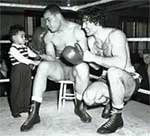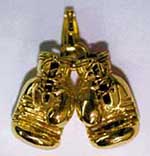
Boxing: Golden Gloves
Since the Roaring Twenties, the Golden
Gloves Amateur Boxing Tournaments have been enticing young aspiring boxers
off the streets of Chicago and into gymnasiums. There, they learn self-discipline,
skill, and the art of jabbing, punching and weaving, all in order to compete
before thousands of enthusiastic fans. For a few, it is a ticket to fame
and fortune. For most, it is a chance to belong, to make something of their
lives, to learn lessons that last a lifetime.
The  first ever Golden Gloves Tournament was held in 1923 in the Chicago
Stadium, the brainchild of sportswriter, columnist and fan Arch Ward, under
the sponsorship of the Chicago Tribune (testing the State of Illinois' anti-boxing
law). Although it took four more years to achieve the legalization of amateur
boxing, that seminal event, a six-night "mini-Olympics" with kids from
one Chicago ethnic neighborhood going one-on-one with kids from another,
was the beginning of a tradition that started here and spread across the
globe. The Golden Gloves began with the hope that through boxing, neighborhood
kids could learn the discipline of directing their energies constructively.
first ever Golden Gloves Tournament was held in 1923 in the Chicago
Stadium, the brainchild of sportswriter, columnist and fan Arch Ward, under
the sponsorship of the Chicago Tribune (testing the State of Illinois' anti-boxing
law). Although it took four more years to achieve the legalization of amateur
boxing, that seminal event, a six-night "mini-Olympics" with kids from
one Chicago ethnic neighborhood going one-on-one with kids from another,
was the beginning of a tradition that started here and spread across the
globe. The Golden Gloves began with the hope that through boxing, neighborhood
kids could learn the discipline of directing their energies constructively.
Many Golden Gloves participants went on to become professionals. Some were champions:
Joe Louis, Muhammad Ali, Joe Frazier, and Barney Ross. Still others went
on to successful careers outside of boxing, including Illinois Attorney
General Jim Ryan and the late Judge Abraham Lincoln Marovitz.
Links of Interest
International Boxing Hall
of Fame
The IBHOF website of the museum in Canastota, NY, offers information about
the Hall of Fame Enshrinees, legends and lore, boxing news, and more.
Voices of the Golden Gloves
Malachy Farrell, Golden Gloves boxer:
When most people go into the ring, they try and get themselves psyched
up and angry and all pumped up. I just like to relax. I go out there nice
and relaxed and think about what I'm doing and not worrying about anything
else outside the ring or about what the other guy is doing in there. If
you fight a guy more than once, which usually around here you do, you know
what he's gonna do before he does it. And you just try and get out of the
way before he can hit you.
There's a lot more people get hurt in football and hockey. And basketball
probably has more injuries than boxing. They have so many precautions for
boxing, it's unbelievable. And it's just a pure and single sport you can
get to these days where it's one-on-one and everything else is left outside
the ring. All the contact and all that stuff is left outside and just two
guys that go toe to toe. There's no sport that can offer that except for
boxing.
You don't hate [your opponent] while you're in there either. It's just
a sport. No one ever has bad feelings about the guy that they're gonna
fight. I shouldn't say never, but most of the time you don't. I would never
turn down a fight from anybody. My brother, my best friend, it wouldn't
matter, 'cause it's only while you're fighting that you're gonna be hitting
him. And afterwards you just go right back to being friends or whatever
your relationship was before.
I used to street fight when I was younger. And then when I started boxing,
I kind of gave up on that. It didn't seem to have any point to it, where
with this, there's always a point.
Shay Mobley, Golden Gloves boxer:
Basically, the way I prepare is, in the morning I wake up at like 5:00
in the morning. And I run two or three miles a day. Then I go to work at
8:00 and work a full eight-hour day. And after I get off the train from
work, I come straight to practice and then I work out for two hours. Then
before my practicing, I do sprints, to keep my wind up a little bit. Open
up the lungs. And I jump rope, just to get everything moving in my body,
which you have to stretch. You have to stretch your body real good.
This is my second Golden Gloves Championship that I'm involved in. Last
year I made it to the Championship and I lost in a close decision. But
this year now, I learned from leaving the boxing in the judge's hands.
So I have to take it off the judge's hands and take my guy out, because
that's the thing to do. Because if you leave it in the judge's hands, if
they like the guy, they're gonna pick the guy. So right now, I'm studying
and focusing on taking the guy out early. I intend to be number one. I'm
gonna win, that's why they gonna call me the hitman. They'll see. They'll
see, definitely.
Martin McGarry, former Golden Gloves boxer & owner of McGarry's Gym:
The Golden Gloves is a very prestigious tournament. It's every kid's dream
to win the Golden Gloves' title.
Boxing gives people a lot of confidence and it betters their outlook on
life. And helps them also to work tremendously, to perform on the job.
And it teaches them respect for other people, which is very important.
It's a foundation for good character.
It's one of the toughest sports there is. And they put everything into
it. They train hard and they want to be the champion and they want to make
it rewarding, financially rewarding.
I dream that I'll have a champion out of here someday, you know. And hopefully
it won't be too long. I have a lot of good young fighters that are very
determined and they train hard.
Boxing I think serves two purposes. It definitely puts the fear of God
into a fighter. And then also enables them to beat the devil out of somebody
in the ring.
Sam Colonna, Windy City Gym head trainer:
You know, when a boy comes down here, the first goal is, "Look, I want
to win the Chicago Golden Gloves." That's like a boxer's dream, is to win
the Golden Gloves. So, they ask me, "How do you think I'm going to do in
the Golden Gloves?" And I say, "Well, it's not how you're going to do.
It's what you put into it. It's how bad you want it. And, the one that
wants it the most, he's going to be the one that's going to win the Golden
Gloves."
I won't refuse no one. If you're willing to work with me, if you're giving
me 110 percent, I'll give you as much as you've given me. And I feel that
everybody in here is equal, as much as the Champion. And what they put
in, I'll give it right back to them.
It's like a family in here. Everybody is trying to help each other. These
guys all go through the same routine, if you're no good or you're good.
They all go through it, the pain, the sacrifice to be here, the punches.
You have to be a special person to be in boxing. Not everybody can just
come in here and box. It's a lot of discipline, a lot of will.
The most humble person could be a boxer, you know. You get a guy off the
street that thinks he's a real badass and he comes in here, he's nobody.
He's just another person, you know? It's a skill. It's what you learn.
It's the sacrifices, the training. You don't have to be the smartest person,
[but] you can be a lawyer and be a boxer. We have a doctor that boxes,
we have a school teacher that's in the Golden Gloves. He's in the finals.
So you don't have to be a certain height or certain weight. You don't have
to be 6' 5". You could be 5' 1". You could weigh 200. You could weigh 112.
It doesn't have to be like basketball or football. This is an individual
sport and it's for a lot of people.
John Lira, former Golden Gloves boxer:
I had compiled a long arrest record from the time I was 8 or 9 years old
up until the time I was 19, and the many judges I stood before had wanted
to wash their hands with my life and they seen that that I was gonna be
going nowhere, and they were getting ready to lock me up and throw away
the key.
 One
[criminal court] judge, Marvin Aspen [now Chief Judge of the U.S. District
Court here] took a chance. He said if I kept my life clean, he's have a
surprise for me. He turned the sentencing around and maintained as long
I stood into boxing and kept discipline and lived a clean lifestyle and
continued to win my fights he'd put me on a work release program and I
think I was one of the pilot individuals that started the work release
program from what I had done through boxing. I became the middleweight
champion of the Golden Gloves in that year.
One
[criminal court] judge, Marvin Aspen [now Chief Judge of the U.S. District
Court here] took a chance. He said if I kept my life clean, he's have a
surprise for me. He turned the sentencing around and maintained as long
I stood into boxing and kept discipline and lived a clean lifestyle and
continued to win my fights he'd put me on a work release program and I
think I was one of the pilot individuals that started the work release
program from what I had done through boxing. I became the middleweight
champion of the Golden Gloves in that year.
I am a true testimony of what boxing can do as far as building character
and taking a young man's negative energy and turning it to a positive direction.
I should either have been dead, in the penitentiary, or both but here I
am talking to you.
About the Program Producer
Terry Spencer Hesser has written, directed and produced many acclaimed
local and national PBS programs, including the WTTW documentary "Treasures
of the Art Institute," "A Man And A School: The Providence-St.Mel Story," narrated
by Oprah Winfrey; "Protect Yourself," hosted by Audrey Hepburn, teaching
fifth graders how to protect themselves against HIV and AIDS; and "The
Auditorium Building: An Architectural Triumph," hosted by Studs Terkel.

Your $40 Gift Membership will include:
|
























































